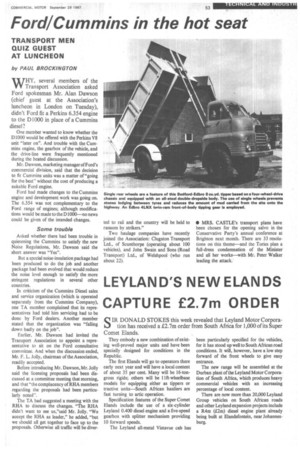Ford/Cummins in the hot seat
Page 55

If you've noticed an error in this article please click here to report it so we can fix it.
TRANSPORT MEN QUIZ GUEST AT LUNCHEON
by PAUL BROCKINGTON
WHY, several members of the Transport Association asked Ford spokesman Mr. Alan Dawson (chief guest at the Association's luncheon in London on Tuesday), didn't Ford fit a Perkins 6.354 engine to the D1000 in place of a Cummins diesel?
One member wanted to know whether the D1000 would be offered with the Perkins V8 unit "later on". And trouble with the Cummins engine, the gearbox of the vehicle, and the drive-line were frequently mentioned during the heated discussion.
Mr. Dawson, marketing manager of Ford's commercial division, said that the decision to fit Cummins units was a matter of "going for the best" without the cost of producing a suitable Ford engine.
Ford had made changes to the Cummins engine and development work was going on. The 6.354 was not complementary to the Ford range of engines; although modifications would be made to the D1000—no news could be given of the intended changes.
Some trouble Asked whether there had been trouble in quietening the Cummins to satisfy the new Noise Regulations, Mr. Dawson said the short answer was "Yes".
But a special noise-insulation package had been produced to do the job and another package had been evolved that would reduce the noise level enough to satisfy the more stringent regulations in several other countries.
In criticism of the Cummins Diesel sales and service organization (which is operated separately from the Cummins Company), one TA member complained that its representatives had told him servicing had to be done by Ford dealers. Another member stated that the organization was "falling down badly on the job".
Earlier, Mr. Dawson had invited the Transport Association to appoint a representative to sit on the Ford consultative committee. And when the discussion ended, Mr. F. L. Jolly, chairman of the Association, readily accepted.
Before introducing Mr. Dawson, Mr. Jolly said the licensing proposals had been discussed at a committee meeting that morning, and that "the complacency of RHA members regarding the proposals had been particularly noted-.
The TA had suggested a meeting with the RHA to discuss the changes. "The RHA didn't want to see us,"said Mr. Jolly. "We accept the RHA as leader," he added, "but we should all get together to face up to the proposals. Otherwise all traffic will be diver
ted to rail and the country will be held to ransom by strikers."
Two haulage companies have recently joined the Association: Clugston Transport Ltd., of Scunthorpe (operating about 100 vehicles), and John Swain and Sons (Road Transport) Ltd., of Welshpool (who run about 22). • MRS. CASTLE's transport plans have been chosen for the opening salvo in the Conservative Party's annual conference at Brighton next month. There are 33 resolutions on this theme—and the Tories plan a full-dress condemnation of the Minister and all her works—with Mr. Peter Walker leading the attack.




































































































































































